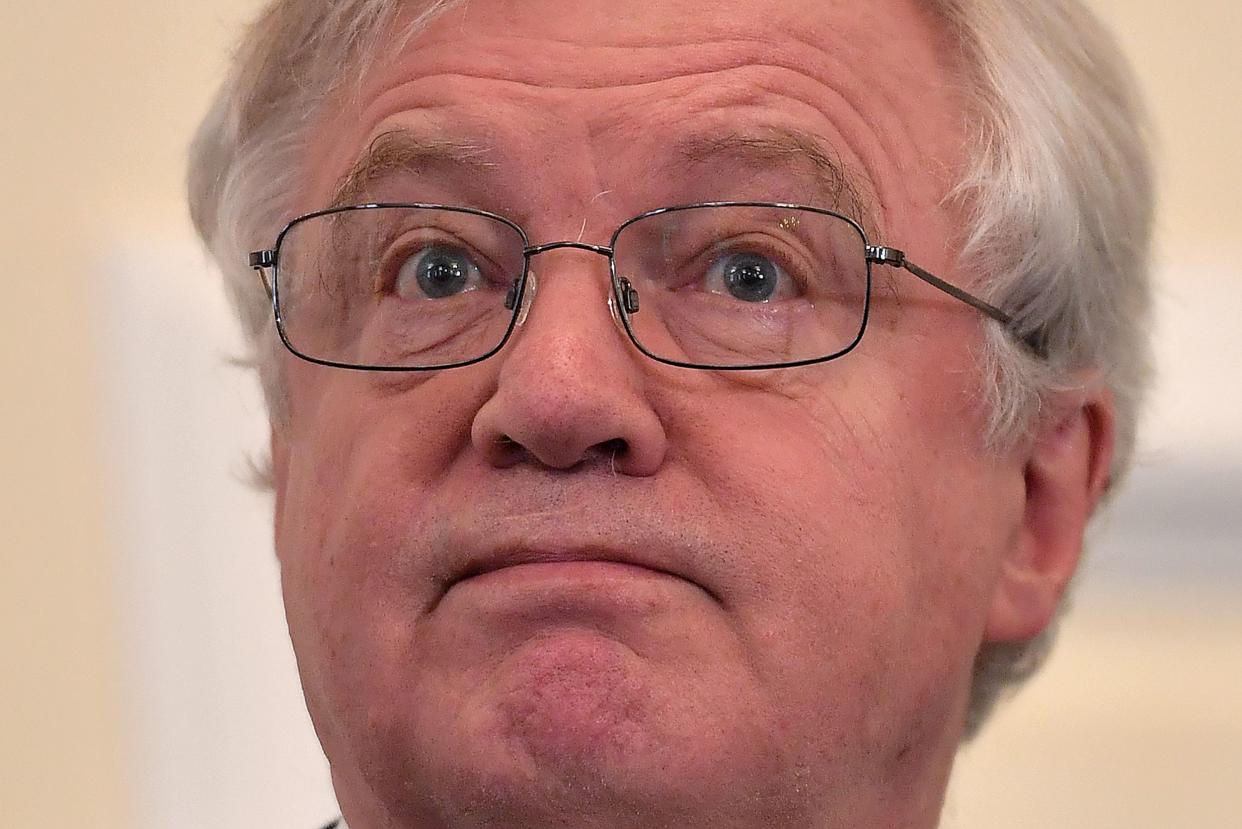The only surprise about David Davis demanding RAF flights around Europe is that he hasn't yet turned up to meetings in a Spitfire

As the substance of Brexit turns uglier, the symbolism becomes more exquisite. I’m not sure how much comfort that paradox provides. It feels like giving someone drowning in cow dung a spray of a delectable perfume.
Still, in dismal times you take what solace you may, and two news stories coalesce to clarify the situation with tragicomic precision.
The first concerns David Davis, the Brexit Secretary whose negotiating skills hint at a parrot – not a bright parrot, mind; the parrot known throughout the aviary as Dumbo McDunceface – cheerfully bidding against itself for an item no one else in the auction room wants to buy.
A new book by the political journalist Tim Shipman includes a claim effectively confirmed by “friends of Davis” (friends? seriously?). The non-denial denial took the form of dismissing this as “gossip”.
The “gossip” is that Davis has wasted tens of thousands by insisting on the use of RAF planes to take him to Brussels and other European capitals in pursuit of mis-negotiating us to perdition.
Shipman reports that when Davis first made such demands, his top civil servant, Oliver Robbins, vetoed them. Presumably Robbins reckoned that a flight to a European capital on a commercial carrier is not a draining experience for as vigorous an able-bodied traveller as Davis. Cabinet ministers on government business are spared the familiar tortures if they stoically consent to fly with British Airways at relatively low expense. They are whisked through check-in and airport security, and need not remove their shoes.
An RAF flight, while it might spare someone a few minutes at a boarding gate, is not cheap. Davis’s trip to Finland and Sweden in February, for example, cost more than £5,000 – quite an extravagance even if he was accompanied by his officials.
So why did Davis blackmail Downing Street (the drama queen threatened not to make the trips at all, writes Shipman, unless permission was granted) into letting him take RAF flights?
The obvious answer is that chippy men throw their weight around in a quest to feel important. But along with sating the squeaky demands of a fragile ego, I suspect warped romanticism played a part.
On his office wall, Davis keeps a map of Europe in the 18th century when the British Empire was at its peak. For a Boy’s Own nostalgist stirred by tales of derring-do, could there be a bigger thrill than joining the RAF to wage a demented rerun of an earlier existential battle for British survival? The only surprise is that Davis did not, so far as we know, insist on a Spitfire.
While Shipman doesn’t mention his attire on sorties into enemy territory, I imagine him striding across the tarmac in a leather flying jacket, yelling “Chocs away, lads. Let’s give the Hun a dashed good seeing to, and it’s bratwurst for breakfast in Berlin in the morning!”
His role model isn’t clear. It might be a Second World War ace such as Douglas Bader, but my guess is he’s more inspired by Rik Mayall’s Squadron Commander the Lord Flashheart in Blackadder Goes Forth.
Admittedly, Davis’s take on what constitutes a cunning plan puts you in mind more of Baldrick. But in his own head, if nowhere else, perhaps he sees himself as a dashing, thigh-slapping, omni-rogering hero, and the underpants that could contain his manhood have yet to be built.
If he is a lone rearguard against the decline of British power, that other piece of symbolism implies he has his work cut out. In 1946, midway between the end of the Second World War and the wedlock of the Queen and Prince Philip, the International Court of Justice was instituted in The Hague.
For 71 years, a judge from the United Kingdom has sat on the “world court”, but no longer. This week, lack of support from the European Union and beyond forced the British nominee to stand aside in favour of a candidate from India.
This is surely a pointer to the much grander humiliation ahead. How long can a shrilly isolationist little island keep the permanent seat on the UN Security Council at the expense of the emerging economic Goliath that also happens to be the planet’s largest democracy?
The world court’s primary function is to rule on questions of sovereignty. Maybe, one of these days, that new Indian judge and his colleagues will adjudicate on what, if anything, “regaining our sovereignty” actually means.
For now, that must remain a mystery as two competing isolationist visions of Brexit fight it out to the death. One is Bomber Davis’s Battle of Britain schoolboy fantasy of leading the few in defence of the realm against the German-led Axis Powers, and emerging triumphant.
The other, represented by the humiliation in The Hague, is the galloping irrelevance of a country led by donkeys towards the sullen acceptance of its shrinkage from a second rank power to a tiny cameo player on the global stage.
Ah well, at least there’s one more nugget of consolation. Even if the second vision wins the day, it won’t have been a total disaster. A middle-aged dreamer had the chance to live out a cherished fantasy by pretending to be in the RAF. However much it cost, you cannot put a price on that.

 Yahoo News
Yahoo News 
